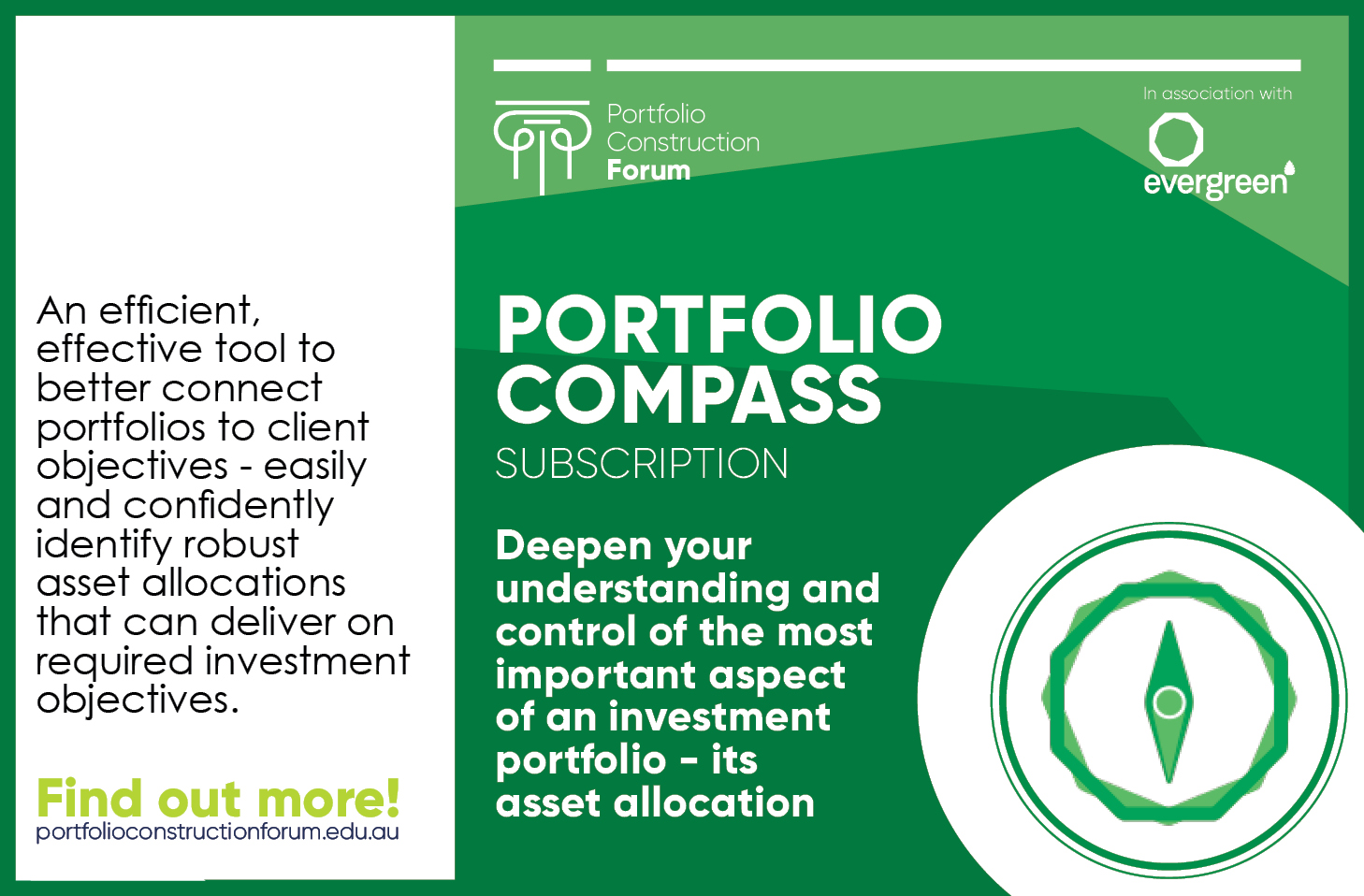Behavioural Finance - Investment Decision-Making short course
Examining systematic human preferences that shape investment decision-making success
Humans did not arrive at the top of the food-chain by chance. Collectively, we are the smartest creatures out there, by far, because we’re able to shrewdly optimise resources to reach our goals. Nowhere is this more energetically pursued than in investment decision-making.
Led by behavioural finance expert, Herman Brodie and encompassing 15 online, on-demand lectures watched on-demand at your own pace, this course examines each stage of the investment decision-making process to reveal the systematic human preferences that shape its success, incorporating both the theory and practice of how these preferences manifest and how to counter unhelpful influences and prevent them being harmful for investment outcomes.
“Understanding and using a behavioural finance perspective allows us to frame the conversation in a way that we can better help clients act in their own best interests. Without a doubt this course has helped us improve how we now have those client conversations.” - Peter Eichmann, Principal, Park Street Group Wealth Advisers
You will identify, analyse and evaluate the principal human preferences that influence decision-making in situations of uncertainty, so you can recognise and identify these preferences in others, to improve investment decision-making. And, along the way, you’ll earn 8.00 CE/CPD hours. Enrol now
Graham Rich
Dean, Portfolio Construction Forum
QUICKLINKS
- Who should undertake the course?
- About the course - lecturer, format, course outcomes, curriculum, CE/CPD hours
- Enrol now - the fee, what you receive, the process
- Contact us for more information
Who should undertake the course?
The Behavioural Finance - Investment Decision-making course is relevant to all investment and wealth management professionals who have a responsibility to understand and improve investment decision-making.
It is essential for portfolio construction Practitioners and Advocates
By Practitioners we mean those whose primary day-to-day role is as an investment management analyst in any of the following five core roles involved in designing, building and managing multi-asset, multi-manager investment portfolios using (but not necessarily limited to) managed funds from a range of fund companies:
- investment advisers giving investment advice on multi-asset, multi-manager funds to individual investors;
- fund researchers within any financial advisory, fund research, investment consulting, multi-asset, multi-manager funds portfolio, family office, funds management, superannuation, private fund, endowment or investment platform business;
- investment consultants consulting on multi-asset, multi-manager portfolios within any financial advisory, fund research, investment consulting, family office, funds management, superannuation, private fund, endowment or investment platform business;
- portfolio managers designing, building or managing multi-asset, multi-manager investment portfolios for any financial advisory, fund research, investment consulting, family office, funds management, superannuation, private fund, endowment or investment platform business; and/or,
- members of investment committees that oversee multi-asset, multi-manager portfolios or funds.
About the course
The course is managed and delivered by Portfolio Construction Forum, and students enrol through Portfolio Construction Forum. To enrol, you must be a member of Portfolio Construction Forum (membership is complimentary and immediate on registering, if you are not already a member).
Knowledge Domain: Finology
The Forum’s subject matter focus is on five Knowledge Domains – Philosophy, Markets, Strategies, Investing and Finology. The Behavioural Financial - Investment Decision-Making course is focused primarily on our “Finology” knowledge domain.
Finology - Understanding and managing the human factors in portfolio construction
The finology domain is concerned with the human factors in investing and portfolio construction, particularly those grounded in biases (for example, values and ethical beliefs, personality, cognitive and emotional biases) and principal-agent dynamics. The notion of economic rationality, although helpful for modelling and evaluating decision alternatives, lacks the behavioural finance, psychological and sociological realism to support portfolio construction practitioners in many real-world contexts. Finology continuing education helps practitioners better understand and manage their own biases, and those of their colleagues and clients, to facilitate clarity and trust in portfolio construction decision-making.
Learning outcomes
By the end of this course, you should be able to identify, analyse and evaluate the principal human preferences that influence decision-making in situations of uncertainty, namely:
- the motivational factors that drive our search for information;
- the cognitive processes that allow us to swiftly understand and weight the information found;
- the asymmetric perception of gains and losses, and the way it influences risk attitude;
- the inconsistencies in probability evaluation and their consequences for risky choices;
- the inconsistences in time discounting and their implications for preferences and risk attitude; and,
- the consequences of the passage of time for perception and risk attitude.
You will almost certainly not be able to correct your behaviour through becoming aware of these human preferences. However, you will be able to recognise and identify these preferences in others, to improve investment decision-making.
The Lecturer

Herman Brodie is Founder of Prospecta (Birmingham, UK). He is a member of Portfolio Construction Forum’s Finology Faculty. Herman educates and advises professional investors in the use of behavioural finance, helping them improve their individual and group decision-making, their client relationship management, and their asset pricing. In 2013, Herman founded Prospecta, which unites scientists and industry experts to bring the most valuable insights of behavioural economics research to the service of professional decision-makers. He is author of “The Trust Mandate”. Previously, he held investment banking roles in London, Paris and Frankfurt. Herman has a BSc in Management Sciences from University of Manchester.
The Format
The course is a fully online, on-demand program, including:
- 15 online, on-demand lectures spanning six core and nine extension topics that together total 8.00 hours of video lectures. However, there is a lot of information condensed into each lecture and it is likely that you will want to watch them more than once to extract the most from the course.
- 8 CE/CPD hours (including 1.00 CE hour of ethics) that vest in your Forum MyCE record as you absorb each lecture video in full. Please note, if you complete a CE Quiz related to a lecture video in less time than it takes to watch the related video in full, your CE/CPD will be deleted and you will have to repeat the lecture.
- optional readings to extend your learning. The “essential readings” are highly recommended while the “further readings” are recommended if you are particularly interested in a particular topic. curated set of content and extends the core learning activities (lectures) significantly.
- an online Study Plan to help manage your progress through the course.
- a learning journal to help you synthesise and capture your key reflections on the topics, and summarise your key learnings and what you wish to explore further.
On completion, you recieve of the course, you receive a printed certificate of completion to frame and display, and a digital badge to add to your emails and LinkedIn profile.
The curriculum
Core topics
- Lecture 1 - How finance got behavioural (0.25 CE hours)
- Lecture 2 - Organising and processing information (0.50 CE hours)
- Lecture 3 - Prospect theory (0.50 CE hours)
- Lecture 4 - Cognitive dissonance (0.50 CE hours)
- Lecture 5 - Intertemporal choice (0.50 CE hours)
- Lecture 6 - Summary & Recommendations (0.25 CE hours)
Extension topics
- Lecture 7 - The winning prospects of prospect theory (1.00 CE hour)
- Lecture 8 - I’ll see it when I believe it (0.50 CE hours)
- Lecture 9 - Retirement – coming ready or not (0.50 CE hours)
- Lecture 10 - The trust mandate (0.75 CE hours)
- Lecture 11 - Is active trust-building ethical? (0.50 ethics CE hours)
- Lecture 12 - Using personality types to customise client service (0.50 CE hours)
- Lecture 13 - Diversity & inclusion: What’s in it for me? (0.75 CE hours)
- Lecture 14 - Behavioural ethics: Not just for ‘bad’ people (0.50 ethics CE hours)
- Lecture 15 - The hidden motives of investment teams (0.50 CE hours)
The curriculum in detail
Lecture 1. - How finance got behavioural
Classical economists often incorporated human behaviour into their thinking. But in the 1960s and 1970s, homo economicus - the great rational agent of economic theory - was born. It was not until the 1990s that the link between human behaviour and economics began to be re-established. Part of the Finology short course, Behavioural Finance - Investment Decision-Making, this lecture reviews the evolution of economic thinking, concluding that, with the link between human behaviour and economics being re-established, economics has come full circle.
- Accreditation: 0.25 CE/CPD hrs
Lecture 2. Organising and processing information
How we organise information in our heads, evaluate it, give it weight and then store it in our memories impacts our decisions. Part of the Finology short course, Behavioural Finance - Investment Decision-Making, this lecture looks at the concept of the schema, a mental model of the world we use to swiftly understand incoming information.
- Accreditation: 0.50 CE/CPD hrs
Lecture 3. Prospect theory
The ability of prospect theory to explain many observations in both investing and everyday decision-making made it an incredibly powerful approach in economics. But that wasn’t enough to allow it to challenge ‘expected utility theory’. To do that it needed to consider the way in which people evaluate probabilities. Part of the Finology short course, Behavioural Finance - Investment Decision-Making, this lecture reviews prospect theory, the disposition effect, and expected utility theory.
- Accreditation: 0.50 CE/CPD hrs
Lecture 4. Cognitive dissonance
Cognitive dissonance theory can explain our motivation to seek the information that drives our choices. Part of the Finology short course, Behavioural Finance - Investment Decision-Making, this lecture reviews the theory of cognitive dissonance and the mental discomfort that results from holding conflicting beliefs, values or attitudes, that can explain our motivation to seek the information that drives our choices.
- Accreditation: 0.50 CE/CPD hrs
Lecture 5. Intertemporal choice
Standard finance assumes that economic agents discount the future exponentially - yet the original proponents of Discounted Utility Theory conceded that human beings do not act that way. Part of the Finology short course, Behavioural Finance - Investment Decision-Making, this lecture reviews what researchers have discovered about intertemporal choice, the process by which people make decisions about what and how much to do at various points in time, when choices at one time influence the possibilities available at other points in time.
- Accreditation: 0.50 CE/CPD hrs
Lecture 6. Summary & recommendations
Stopping losses, exposing ourselves to information that goes against our beliefs, not indulging story-tellers, facing hard truths about our past decisions - all these things detract from our comfort. Part of the Finology short course, Behavioural Finance - Investment Decision-Making, this lecture provides 10 recommendations for improving investment decision-making, drawing on the learnings from Lectures 1 to 5.
- Accreditation: 0.25 CE/CPD hrs
Lecture 7. The winning prospects of prospect theory
Two of the most important practical implications of prospect theory in asset pricing are the existence of price momentum, and investors’ preferences for skewness in the distribution of returns. Part of the Finology short course, Behavioural Finance - Investment Decision-Making, this lecture reviews explains why these phenomena persist and practical ways they can be exploited.
- Accreditation: 1.00 CE/CPD hrs
Lecture 8. I’ll see it when I believe it
We like to think our beliefs are the result of a long, thoughtful evaluation, the product of carefully curated information and our personal experiences. Part of the Finology short course, Behavioural Finance - Investment Decision-Making, this lecture reveals the origins of many of our beliefs, and shows what we can do to make our belief-building more robust.
- Accreditation: 0.50 CE/CPD hrs
Lecture 9. Retirement, coming ready or not
When should I retire? Will I be happy? How long will I live? Our responses to questions like these are prone to systematic biases that influence our choices and, ultimately, life satisfaction in retirement. Part of the Finology short course, Behavioural Finance - Investment Decision-Making, this lecture focuses on the behavioural influences on decision making about the transition from the workforce into retirement.
- Accreditation: 0.50 CE/CPD hrs
Lecture 10. The trust mandate
Why is it that a client selects one asset manager over another? And why are some asset managers retained during the challenging periods in the cycle and others are not? Part of the Finology short course, Behavioural Finance - Investment Decision-Making, this lecture concerns the science of trust, revealing what really causes trust to be built over time.
- Accreditation: 0.75 CE/CPD hrs
Lecture 11. Is active trust-building ethical?
Advisers, not clients, are responsible for the creation of a high-trust relationships. But when does interpersonal trust building become selfish manipulation? Part of the Finology short course, Behavioural Finance - Investment Decision-Making, this lecture reviews the ethical limits to advisers’ actions to build and maintain trust with clients.
- Accreditation: 0.50 ethics CE/CPD hrs
Lecture 12. Using personality types to customise client service
As for other life outcomes, personality types are useful in explaining personal finance outcomes such as wealth accumulation, retirement planning, spending, compulsive consumption, indebtedness, and risk-taking. Part of the Finology short course, Behavioural Finance - Investment Decision-Making, this lecture explores the link between personality and individual preferences for communication, information-seeking, and susceptibility to persuasion.
- Accreditation: 0.50 CE/CPD hrs
Lecture 13. Diversity & inclusion: what’s in it for me?
Greater career success is the reward for individuals who see Diversity and Inclusion as a skill to be learned. Part of the Finology short course, Behavioural Finance - Investment Decision-Making, this lecture examines the hurdles to progress towards a genuinely inclusive workplace from a behavioural perspective.
- Accreditation: 0.75 CE/CPD hrs
Lecture 14. Behavioural ethics: not just for ‘bad’ people
The typical carrot-and-stick approach to ethics assumes that people faced with ethical dilemmas conduct a conscious, deliberate, cost-benefit analysis before making decisions. Yet, the behavioural sciences have shown us that our decision-making is often non-conscious and automatic. Part of the Finology short course, Behavioural Finance - Investment Decision-Making, this lecture examines insights from the behavioural sciences that can help us adhere to our stated ethical principles.
- Accreditation: 0.50 ethics CE/CPD hrs
Lecture 15. The hidden motives of investment teams
People attach great importance to their social connections. Yet, this social goal will not always dovetail with groups securing the best possible decision. Part of the Finology short course, Behavioural Finance - Investment Decision-Making, this lecture examines how we can improve group activity to help ensure dedication to the organisational objective becomes precisely the route by which we achieve social rewards.
- Accreditation: 0.50 CE/CPD hrs
Enrol now
The course is managed and delivered by Portfolio Construction Forum, and students enrol through Portfolio Construction Forum. In order to enrol, you must be a member of Portfolio Construction Forum (membership is complimentary and immediate on registering).
You can enrol at any time - once enrolled, you have 12 months to complete the course. The course is a fully online, on-demand self-study program.
What you receive:
- 15 online, on-demand lectures spanning six core and nine extension topics that together total 8.00 hours of video lectures. However, there is a lot of information condensed into each lecture and it is likely that you will want to watch them more than once to extract the most from the course.
- optional readings to extend your learning. The “essential readings” are highly recommended while the “further readings” are recommended if you are particularly interested in a particular topic.
- an online Study Plan to help manage your progress through the course.
- a learning journal to help you synthesise and capture your key reflections on the topics, and summarise your key learnings and what you wish to explore further.
- 8 CE/CPD hours that vest in your Forum MyCE record as you complete each lecture in full. Please note, if you complete a lecture in less time than it takes to watch the related video(s) in full, your CE/CPD will be deleted and you will have to repeat the lecture.
- a printed certificate of completion to frame and display, and a digital badge to add to your emails and LinkedIn profile.
The process: As soon as you enrol and pay the enrolment fee, you will immediately receive an email explaining how to access to the course materials so you can get going right away. This email will also contain a tax invoice for your records.
Enrolment fee: A$795+GST payable by credit card on enrolment. You receive a tax invoice by email immediately after payment. Enrol now







